
The Second Peloponnesian War, often called simply the Peloponnesian War, was an ancient Greek war fought between Athens and Sparta and their respective allies for the hegemony of the Greek world. The war remained undecided until the later intervention of the Persian Empire in support of Sparta. Led by Lysander, the Spartan fleet finally defeated Athens which began a period of Spartan hegemony over Greece.

Pericles was a Greek politician and general during the Golden Age of Athens. He was prominent and influential in Ancient Athenian politics, particularly between the Greco-Persian Wars and the Peloponnesian War, and was acclaimed by Thucydides, a contemporary historian, as "the first citizen of Athens". Pericles turned the Delian League into an Athenian empire and led his countrymen during the first two years of the Peloponnesian War. The period during which he led Athens as Archon (ruler), roughly from 461 to 429 BC, is sometimes known as the "Age of Pericles", but the period thus denoted can include times as early as the Persian Wars or as late as the following century.
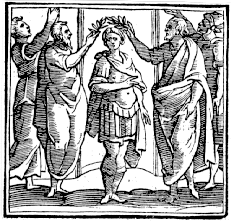
Thrasybulus was an Athenian general and democratic leader. In 411 BC, in the wake of an oligarchic coup at Athens, the pro-democracy sailors at Samos elected him as a general, making him a primary leader of the ultimately successful democratic resistance to the coup. As general, he was responsible for recalling the controversial nobleman Alcibiades from exile, and the two worked together extensively over the next several years. In 411 and 410, Thrasybulus was in command along with Alcibiades and others at several critical Athenian naval victories.

Alcibiades was an Athenian statesman and general. The last of the Alcmaeonidae, he played a major role in the second half of the Peloponnesian War as a strategic advisor, military commander, and politician, but subsequently fell from prominence.

Theramenes was an Athenian military leader and statesman, prominent in the final decade of the Peloponnesian War. He was active during the two periods of oligarchic government at Athens, the 400 and later the Thirty Tyrants, as well as in the trial of the generals who had commanded at Arginusae in 406 BC. A moderate oligarch, he often found himself caught between the democrats on the one hand and the extremist oligarchs on the other. Successful in replacing a narrow oligarchy with a broader one in 411 BC, he failed to achieve the same end in 404 BC, and was executed by the extremists whose policies he had opposed.
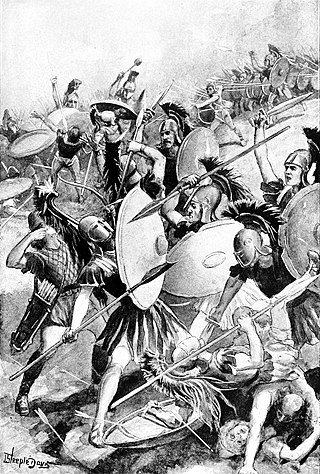
The Sicilian Expedition was an Athenian military expedition to Sicily, which took place from 415–413 BC during the Peloponnesian War between Athens on one side and Sparta, Syracuse and Corinth on the other. The expedition ended in a devastating defeat for the Athenian forces, severely affecting Athens.
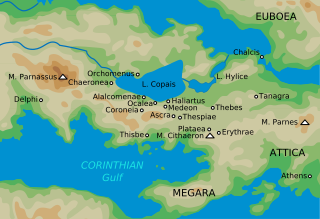
The Battle of Tanagra was a land battle that took place in Boeotia in 457 BC between Athens and Sparta during the First Peloponnesian War. Tension between Athens and Sparta had built up due the rebuilding of Athens' walls and Spartan rejection of Athenian military assistance. The Athenians were led by Myronides and held a strength of 14,000. The Spartans were led by Nicomedes and had a total of 11,500 soldiers. While both the Athenians and Spartans suffered great losses, Sparta ultimately claimed victory in this battle.
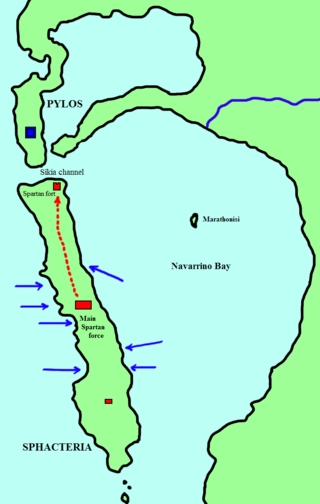
The Battle of Sphacteria was a land battle of the Peloponnesian War, fought in 425 BC between Athens and Sparta. Following the Battle of Pylos and subsequent peace negotiations, which failed, a number of Spartans were stranded on the island of Sphacteria. An Athenian force under Cleon and Demosthenes attacked and forced them to surrender.

The Battle of Amphipolis was fought in 422 BC during the Peloponnesian War between Athens and Sparta. It was the culmination of events that began in 424 BC with the capture of Amphipolis by the Spartans.
The first Battle of Mantinea was fought in 418 BC during the Peloponnesian War. In this battle, Sparta and its Peloponnesian allies defeated an allied army of Argos, Athens, Mantinea and several others.
The naval Battle of Cynossema took place in 411 BC during the Second Peloponnesian War. In the battle, an Athenian fleet commanded by Thrasybulus and Thrasyllus, although initially thrown on the defensive by a numerically superior Spartan fleet, won a narrow victory. This victory had an impact out of proportion to its tactical significance, coming when Athens' traditional democratic government had been replaced by an oligarchy and an Athenian defeat could have ended the war. The newly confident Athenian fleet proceeded to win two more victories in the Hellespont in quick succession, the second being the dramatic rout at Cyzicus, which ended the immediate Spartan threat to Athens' Black Sea lifeline.
Phormio, the son of Asopius, was an Athenian general and admiral before and during the Peloponnesian War. A talented naval commander, Phormio commanded at several famous Athenian victories in 428 BC, and was honoured after his death with a statue on the acropolis and a state funeral. He is considered one of Athens' many great admirals, alongside Themistocles and Cimon.
Thrasyllus was an Athenian strategos (general) and statesman who rose to prominence in the later years of the Peloponnesian War. First appearing in Athenian politics in 410 BC, in the wake of the Athenian coup of 411 BC, he played a role in organizing democratic resistance in an Athenian fleet at Samos. There, he was elected strategos by the sailors and soldiers of the fleet, and held the position until he was controversially executed several years later after the Battle of Arginusae.
The First Peloponnesian War was fought between Sparta as the leaders of the Peloponnesian League and Sparta's other allies, most notably Thebes, and the Delian League led by Athens with support from Argos. This war consisted of a series of conflicts and minor wars, such as the Second Sacred War. There were several causes for the war including the building of the Athenian long walls, Megara's defection and the envy and concern felt by Sparta at the growth of the Athenian Empire.
The Mytilenean revolt was an incident in the Peloponnesian War in which the city of Mytilene attempted to unify the island of Lesbos under its control and revolt from the Athenian Empire. In 428 BC, the Mytilenean government planned a rebellion in concert with Sparta, Boeotia, and certain other cities on the island, and began preparing to revolt by fortifying the city and laying in supplies for a prolonged war. These preparations were interrupted by the Athenian fleet, which had been notified of the plot, and the Mytileneans sent representatives to Athens to discuss a settlement, but simultaneously dispatched a secret embassy to Sparta to request support.
The Aetolian campaign, often referred to as "Demosthenes' Aetolian campaign", was a failed Athenian offensive in northwestern Greece during the Archidamian War. In 426 BCE, Demosthenes was dispatched from Athens to the Corinthian Gulf in command of a fleet of 30 ships. Arriving in the north-west, he quickly assembled a coalition force from Athens' allies in the region and besieged the city of Leucas. However, before the siege reached a conclusion, he was persuaded to abandon it in favour of an attack on the tribal region of Aetolia. Leaving Leucas, he set out towards Aetolia, losing along the way several major contingents from his army, whose leaders were apparently unhappy with his change in strategy.

The Battle of the Eurymedon was a double battle, taking place both on water and land, between the Delian League of Athens and her Allies, and the Persian Empire of Xerxes I. It took place in either 469 or 466 BCE, in the vicinity of the mouth of the Eurymedon River in Pamphylia, Asia Minor. It forms part of the Wars of the Delian League, itself part of the larger Greco-Persian Wars.
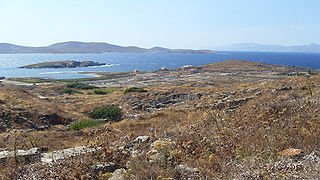
The Wars of the Delian League were a series of campaigns fought between the Delian League of Athens and her allies, and the Achaemenid Empire of Persia. These conflicts represent a continuation of the Greco-Persian Wars, after the Ionian Revolt and the first and second Persian invasions of Greece.
Amphilochian Argos was the chief town of ancient Amphilochia, situated at the eastern extremity of the Ambraciot Gulf, on the river Inachus. Its territory was called Argeia (Ἀργεία).

Cnemus was the Spartan fleet commander during the second and third years of the Archidamian War. During his command, Cnemus oversaw a series of operations that met with failure. As a result, the Spartans began to question Cnemus' leadership and sent several advisers to assist him in his command.
Thucydides. The Peloponnesian War. London, J. M. Dent; New York, E. P. Dutton. 1910.











